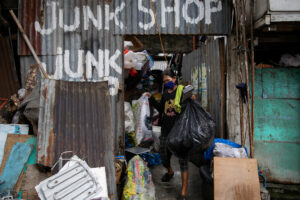
Philippine waste pickers may be missing piece in EPR enigma
By Sheldeen Joy Talavera, Reporter
APOLINARIO O. GERONIMO’S otherwise soft voice blares through the megaphone as he combs the streets of Tondo, Manila on his sidecar trying to collect scrap TVs and electric fans from residents.
“I disassemble broken appliances and sell the copper wire and other metals to a nearby scrapyard,” the 66-year-old widower and father of 14, who’s been making money from trash since 2000, said by telephone in Filipino. “Sometimes, I fix and sell them for cheap.”
Mr. Geronimo is already a step ahead of the average waste picker in the Philippines who, according to the International Alliance of Waste Pickers (IAWP), earns P70 ($1.26) to P100 a day.
The Philippines generates 61,000 metric tons of solid waste daily, as much as a quarter of which is plastic, according to the Department of Environment and Natural Resources (DENR).
The informal waste sector also includes waste pickers at dumpsites and communal waste collection points who help recycle trash in a country where solid waste management is rarely enforced among households.
Informal waste pickers collect a staggering 60% of the world’s plastics destined for recycling, according to the IAWP.
Environment Secretary Maria Antonia Yulo-Loyzaga has said she wants to integrate the informal waste sector into the extended producer responsibility (EPR) system.
The EPR Act, which lapsed into law in 2022, requires big companies with assets worth more than P100 million to be environmentally responsible throughout the life cycle of a product, especially its post-consumer or end-of-life stage.
Under the law, these companies must register with the National Solid Waste Management Commission their EPR programs to reduce or recover for reuse or recycling the plastic packaging waste that they release to the local market.
Plastic packaging covered by the law includes sachets, labels, laminates and other flexible plastic packaging products; rigid plastics used for beverages, food, home, personal care and cosmetic products and their caps, cutlery, plates and drinking straws; plastic bags; and polystyrene.
DENR data showed that as of October 2023, 745 enterprises had submitted their EPR programs, fewer than the 4,000 expected.
“The EPR law presents an opportunity for the informal waste sector to be formally included into the circular economy value chain,” the DENR’s Environmental Management Bureau (EMB) said in a Viber message.
Elizabeth dela Torre Ampuyas, 68, who has been a registered member of Canadian social enterprise Plastic Bank since 2019, earns P85 daily by collecting plastic bottles, for which she also gets grocery vouchers and school supplies.
“The vouchers from Plastic Bank are a big help,” she said by telephone in Filipino. “I can also help save the environment by picking up trash.”
Plastic Bank builds recycling ecosystems in underdeveloped communities to fight plastic pollution in oceans and help cut poverty in developing countries.
The for-profit social enterprise partners with companies that buy “social plastics” and repurpose these into another material, Camille Nuñez, marketing manager at Plastic Bank, said in a text message.
“The problem of plastic is systemic,” she said. “The government has been doing its best to provide solutions to the problem. However, it all goes down to how things are implemented. If people understand how valuable plastics are, they will treat plastics as a resource, not as a waste.”
The informal waste sector is often overlooked and doesn’t get enough credit for its contribution to solid waste management, according to Marian Frances T. Ledesma, zero-waste campaigner at Greenpeace Southeast Asia-Philippines.
“The government should recognize the work of the informal waste sector by documenting their roles in the community and making their work official under the law — either as self-employed individuals or as part of a group,” she said in an e-mailed reply to questions.
RECOGNITION
Integrating the informal waste sector into a city’s solid waste management strategies is imperative, according to the United Nations Development Programme (UNDP).
“Despite their significant contributions to waste segregation and recycling, informal waste workers often grapple with challenges such as a lack of formal recognition, discrimination, hazardous working conditions, low income and limited support for livelihood opportunities,” Cheska Peralta, communications analyst for the Accelerating NDC through Circular Economy in Cities (ACE) project, wrote in a blog posted on the UNDP website in December. Ms. Ledesma said waste pickers shouldn’t be boxed into just waste management. “They should be given the opportunity to learn or be trained to lead or participate in sustainable business models,” she added.
She said waste workers might want to work in emerging companies that produce little to no waste, such as those that deal with reverse logistics for reuse systems or startups built on reuse concepts.
Michael Anthony Santos, EPR project manager at the World Wide Fund for Nature (WWF) Philippines, said local governments should start recognizing informal waste workers by giving them IDs.
“If waste workers have IDs, they will be recognized as waste collectors,” he said via Zoom. “The first step in formalizing them is by employing them as barangay waste collectors.”
“It starts with the recognition that they need our help so… the least that local governments can do is to provide them with IDs,” he added.
If done fairly and in consultation with waste workers, integrating the informal waste sector into the EPR law would let them fully participate in the circular economy, Ms. Ledesma said.
The Environment department is encouraging big enterprises to work with cities in integrating the informal waste sector into their extended producer responsibility programs.
“The EPR law may be new, and challenges may arise initially, but as we adapt and learn, the potential to reap the benefits of a circular economy becomes increasingly tangible,” the EMB said.
Mr. Geronimo, the trash collector from Tondo, gets more than a kilo of scrap metal from the broken appliances that he buys from households.
“I earn P500 to P700 a day,” he said. “Sometimes, it’s not enough given spiraling prices, but it’s better than nothing.”



